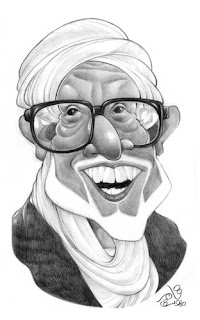Monday, 31 May 2010
Athor in Bentiu?
Death in Dalanj
Saturday, 29 May 2010
Bashir the ..
Tuesday, 25 May 2010
A state 'ghazwa'
Monday, 24 May 2010
Islamist overtures
Sunday, 23 May 2010
We are really lost: an interview with Abdullahi Ali Ibrahim
Wednesday, 19 May 2010
Secessionist diatribes
 Talking on the 27th anniversary of the SPLA/M the Secretary General of the SPLM, Pagan Amum, took a wide stride back into history claiming that the liberation struggle in Southern Sudan started in the 1860s at the time of communal wars involving ‘traditional’ and ‘spiritual’ leaders. In a televised speech he attempted to combine a notion of historical continuity and purpose that leads ultimately to the independence of Southern Sudan next January, presented as the final destination of a long journey of struggle against adversaries, jellaba, British, and Turks. Like all nationalist mythologies this is but an edited, ‘photoshopped’ version of a much more complex and combustible reality, one that Pagan surely knows better.
Talking on the 27th anniversary of the SPLA/M the Secretary General of the SPLM, Pagan Amum, took a wide stride back into history claiming that the liberation struggle in Southern Sudan started in the 1860s at the time of communal wars involving ‘traditional’ and ‘spiritual’ leaders. In a televised speech he attempted to combine a notion of historical continuity and purpose that leads ultimately to the independence of Southern Sudan next January, presented as the final destination of a long journey of struggle against adversaries, jellaba, British, and Turks. Like all nationalist mythologies this is but an edited, ‘photoshopped’ version of a much more complex and combustible reality, one that Pagan surely knows better. Once an ardent defender of the ‘New Sudan’, by adopting a mythology of secessionist destiny Pagan has chosen to relinquish the transformative potential he once adhered to as a matter of principle. In his speech he concluded that there is no more chance to make unity attractive and that the people of Southern Sudan are expected to vote for secession, a consequence of the failure of the National Congress Party to make unity attractive over the past 5 years. In a tragic overture Pagan re-directed his skills and competence from the notion of ‘the problem of Sudan’ to the ‘problem of South Sudan’, from self-determination as a hard-won tool to achieve citizenship, voluntary unity and political transformation in an adverse environment, to self-determination as a teleological channel to a historically pre-determined end-station of separation, from the celebration of diversities to a mythology of seclusion and particularity.
Monday, 17 May 2010
Turabi again
Saturday, 15 May 2010
Rebellion tremors
Monday, 10 May 2010
Unity for sale
Thursday, 6 May 2010
The troubled Sayyid
Last Thursday the NCP in a statement made by Ibrahim Ghandoor welcomed the readiness of Mohamed Osman al Mirghani, Democratic Unionist Party (DUP) chief and Khatmiyya leader, to participate in the coming government awaiting announcement. Mirghani had never refused the notion of participation in government outright. He however had angry words to say in Khartoum airport before leaving for an Egypt/Saudi Arabia trip right after declaration of election results. Apparently he was frustrated at the bad manners of the NCP which declined to provide him with any mentionable breathing space in the election market. Presumably the Egyptian and Saudi patrons pushed him back into NCP arms without further ado. Whatever the particularities of the deal may be the old party is probably in for a not so major a feast. The most generous of reports suggest an offer of four ministerial portfolios plus/minus with no mention of the lucrative governor posts.
The DUP has already suffered repetitive blows from the predator NCP. It has become difficult over the past years to keep track with the number of splinter factions and break-off groups dropping out of the DUP. The home-coming of the old Sayyid back to Sudan after years of ‘exile’ was expected to reverse the tide of splintering, an expectation that failed to materialise. The party remains in shatters. Even its vintage name from its blossoming era under Ismail al Azhari, the National Unionist Party, has been hijacked by a splinter group claiming consistency with the ‘florid’ past. Today the party is only recognisable as itself through the adjunct ‘original’ after its name, in the same manner Khartoum’s mechanics pride with ‘original’ Japanese spare parts in contradistinction to cheaper versions ‘Made in China’.
The demise of the ‘New Sudan’ as promised by the late John Garang, the man who persistently courted the old Sayyid during the life-span of the National Democratic Alliance (NDA) and kept him relatively insulated from aggressive NCP flirts, resulted in the direct delivery of Mirghani into NCP arms, and worse still, decisive regional pressures. Today it seems, even the prospects of renewed silence in exile are limited. Neither Saudi Arabia nor Egypt is ready to accommodate a grumpy Sayyid. They would rather see him shaking hands with Bashir and losing yet more fingers.
The irony of the Sayyid’s situation is that he was the man so close to signing a home-made breakthrough peace agreement with John Garang in 1988/1989 promising unity rather than secession if it wasn’t for the NIF’s overnight takeover. Today he may have to be satisfied with an ultra-junior position in an NCP/SPLM government probably presiding over secession, the Asmara Declaration (1995) notwithstanding.








